4 Mins Read
In its latest sustainability push, home furnishing giant IKEA has committed to making at least 50% of dishes served at its restaurant section plant-based by 2025. The Swedish company will also be bolstering the number of plant-based packaged food offerings to 80% within the next five years.
The world’s largest furniture retailer is going green. Announcing its new food commitments on Monday (November 23), IKEA says that it is “taking the next step towards making healthy and sustainable food more affordable and desirable” to the masses by making half of the main meals in its foodservice and 80% of its packaged food products plant-based.
A truly sustainable food system must be based on delicious, nutritious and responsibly produced food…[we are] using the IKEA reach to make healthy and sustainable food options available to as many people as possible.
Peter van der Poel, Managing Director of Range & Supply, IKEA Sweden
In addition, the company will be reducing the amount of red meat dishes served across its restaurants to under 20%, such as beef and lamb, which represents the most emissions-heavy meats releasing enormous amounts of methane and carbon dioxide into the atmosphere, as well as contributing to unsustainable resource depletion, from deforestation to water contamination.

Commenting on their latest pledge, IKEA Sweden managing director of range and supply, Peter van der Poel, said: “A truly sustainable food system must be based on delicious, nutritious and responsibly produced food…[we are] using the IKEA reach to make healthy and sustainable food options available to as many people as possible.”
With more than 680 million customers purchasing IKEA’s food offerings in its restaurants and bistros around the world each year, the move by the furniture giant could translate to huge carbon savings. A recent report from Oslo-based nonprofit EAT found that if the 20 biggest economies significantly reduced meat and dairy consumption, as much as 40% of the total global carbon budget for food could be freed up.
“IKEA can really make a positive difference here,” said Lena Pripp-Kovac, chief sustainability officer at Inter IKEA Group. “The more sustainable choice shouldn’t be a luxury for the few. It should be part of people’s everyday life.”
The news comes shortly after IKEA announced the launch of its second plant-based meatball offering – a new “plant ball” made from yellow pea protein, oats, potatoes, onion and apples, which it claims carries only 4% of the carbon footprint compared to its traditional meat-based version. At the time, the Swedish chain said that it hoped to target long-time meat-lovers and flexitarians to choose the more sustainable option.

Sustainability has reached top-of-mind concern amongst its customers of late, with the company’s recent poll spanning 27,000 people across 27 countries finding that 75% of consumers want to significantly reduce their environmental impact, with many of them willing to switch to plant-based alternatives if given a product that matched on taste, price and nutrition.
The more sustainable choice shouldn’t be a luxury for the few. It should be part of people’s everyday life.
Lena Pripp-Kovac, Chief Sustainability Officer, Inter IKEA Group
There’s no doubt that the coronavirus pandemic has been a crucial driver of the mass shift away from meat-heavy plates, thanks to headlines of virus-ridden slaughterhouses exposing the dangers of the meat supply chain, prompting consumers to choose safer alternatives.
From the U.S. to the U.K. and Hong Kong, surveys around the world have all indicated somewhat of an awakening, with the majority of shoppers now saying they want to actively reduce their meat consumption as a direct result of the crisis. In the U.S., 92% of first-time buyers of plant-based meat alternatives say they plan to continue doing so even after the pandemic is over.
In a bid to ride the plant-based wave, major food industry players are now all-in on meatless products. While Unilever has set a global annual sales target of €1 billion (US$1.19 billion) for its plant-based meat and dairy category by 2027, British retailer Tesco pledged to increase sales of plant-based meat alternatives by 300% over five years. Fast food giants such as McDonald’s, Pizza Hut, KFC and Burger King have also made various partnerships to roll out more plant-based items across their menus.
Lead image courtesy of IKEA / designed by Green Queen Media.




